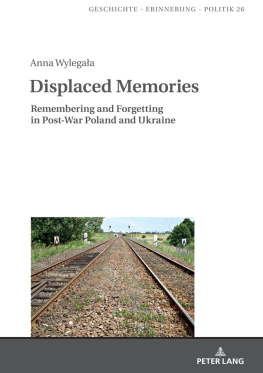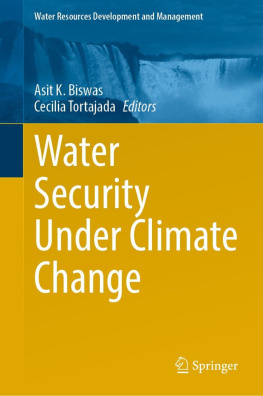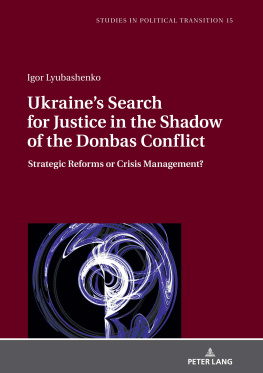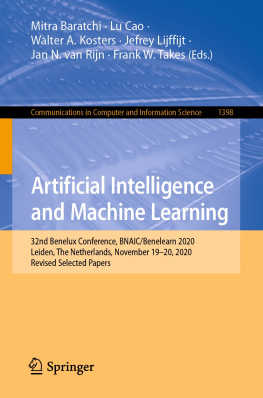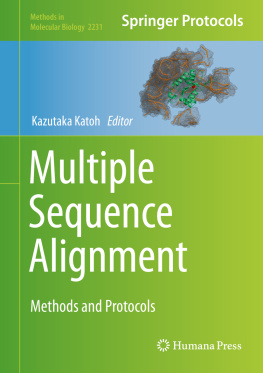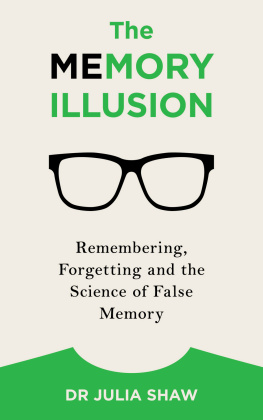
Anna Wylegaa
Displaced Memories
Remembering and Forgetting in Post-War Poland and Ukraine
Translated by Simon Lewis, Copyedited by Klara Naszkowska

Bibliographic Information published by the Deutsche Nationalbibliothek
The Deutsche Nationalbibliothek lists this publication in the Deutsche Nationalbibliografie; detailed bibliographic data is available in the internet at http://dnb.d-nb.de.
Library of Congress Cataloging-in-Publication Data
A CIP catalog record for this book has been applied for at the Library of Congress.

The Publication is funded by Ministry of Science and Higher Education of the Republic of Poland as a part of the National Programme for the Development of the Humanities. This publication reflects the views only of the authors, and the Ministry cannot be held responsible for any use which may be made of the information contained therein.
Cover image: Katarzyna Mado-Mitzner
ISSN 2191-3528
ISBN 978-3-631-67871-8 (Print)
E-ISBN 978-3-653-07004-0 (E-PDF)
E-ISBN 978-3-631-71244-3 (EPUB)
E-ISBN 978-3-631-71245-0 (MOBI)
DOI 10.3726/b15815
Peter Lang GmbH
Internationaler Verlag der Wissenschaften
Berlin 2019
All rights reserved.
Peter Lang Berlin Bern Bruxelles New York Oxford Warszawa Wien
All parts of this publication are protected by copyright. Any utilisation outside the strict limits of the copyright law, without the permission of the publisher, is forbidden and liable to prosecution. This applies in particular to reproductions, translations, microfilming, and storage and processing in electronic retrieval systems.
This publication has been peer reviewed.
www.peterlang.com
GESCHICHTE - ERINNERUNG POLITIK
STUDIES IN HISTORY, MEMORY AND POLITICS
Herausgegeben von / Edited by Anna Wolff-Powska & Piotr Forecki
Bd./Vol . 26

Note on Translation, Transliteration and Names
This book is a translation, but that does not make it simply a product of a Polish monograph being translated into English and revised to accommodate the customs and expectations of an Anglophone readership. The Polish book was written in 2013 and published in 2014, on the basis of research conducted much earlier, between 2008 and 2011. The people interviewed spoke in their own languages: Polish in Poland, and usually Ukrainian but also Russian and Polish in Ukraine. Thus, some quotes were translated into Polish first, and then retranslated into English. The respondents spoke about their own lifeworlds, which also meant that their experiences had to be translated into the analytical language of scholarship. When I started to prepare my Polish book for translation into English, it transpired that it was necessary to write a completely new introduction, as well as to make numerous minor changes to the main text: some details would have been of little interest to a non-Polish reader, whereas other things needed to be expanded and explained more explicitly.
Importantly, although I continue to pay attention to the memory politics and symbolic spaces of both Krzy and Zhovkva (and, of course, in Poland and Ukraine more generally), this book analyses the social reality of these two localities as I encountered them at the time of my fieldwork. Whilst I note more recent changes in the footnotes, the analysis of the interviews does not take later developments into consideration: such an updating would entail, de facto , a whole new round of interviews. This book is thus about Polish and Ukrainian memory before 2014, before the Euromaidan protests and the Russian annexation of Crimea. Whereas the dynamics of memory in Krzy are fairly stable, interviewees in Zhovkva today would probably voice very different opinions, above all anti-Russian and anti-Soviet ones. However, I prefer not to speculate.
In proper nouns and in the references, I transliterate from Russian and Ukrainian in accordance with the Library of Congress system, simplified so as to facilitate reading (e.g. omitting ligatures and soft signs). Towns are referred to using their current names, i.e. Zhovkva and Krzy, when the analysis concerns the present day; however, they are also referred to as kiew and Kreuz when discussing historical matters (before 1939 for the former, before 1945 for the latter). The same principle is applied to other localities whose countries, and therefore also names, changed.
Acknowledgements
The publication of the English version of this book provides a pleasant opportunity to thank people.
This book would never have come into existence without the interviewees, old and young people who agreed to devote their time to me and share their experiences, including very difficult and painful ones. The majority of individuals from the oldest generation have now passed away. I hope they would be pleased that their stories are being made accessible to a wider readership, and that the new readers may perceive a universal dimension in Polish-Ukrainian-German-Jewish experiences of resettlement.
The fieldwork and writing that went into this work would have been impossible without the generous support of numerous institutions. A fellowship at the University of Toronto provided an opportunity to consult literature that was difficult to access in Poland. Research grants from the Polish Centre for Holocaust Research of the Institute of Philosophy and Sociology of the Polish Academy of Sciences, Geschichtswerkstatt Europa and the National Science Centre allowed me to conduct the fieldwork. The Centre for Urban History of East Central Europe in Lviv awarded me a yearlong fellowship and hosted me during all of my trips to Ukraine. The final version of the manuscript, which served as the basis for the English translation, was completed during my fellowship at the Imre Kertsz Kolleg in Jena. The translation itself was supported by a grant from the Polish Ministry of Science and Higher Education.
I would also like to thank all of the people who conducted and recorded the interviews analyzed here, whether as part of the project conducted by the KARTA Centre, their own individual research, or at my request: Dominik Czapigo, Piotr Filipkowski, Jarosaw Paka, Myroslava Keryk, Tetiana Rodnienkova and my mother, Teresa Wylegaa, who was like a guardian angel to the research carried out in Krzy. Successive versions of individual chapters were read and commented on by Halyna Bodnar, Piotr Filipkowski, Tomasz Molenda, Justyna Straczuk, Joanna Wawrzyniak, Joanna Konieczna-Saamatin, Olga Linkiewicz and Grzegorz Motyka. I am also grateful to the examiners of my doctoral dissertation, Professor Kaja Kamierska and Professor Elbieta Tarkowska, as well as numerous anonymous reviewers of those parts of the text that were published earlier as stand-alone articles.
The English version of this text would have been much less accomplished if it were not for the work of the translator, Simon Lewis, to whom I am grateful for his insightful comments and unending patience.
I would also like to acknowledge my teachers, thanks to whom I became the scholar I am: Magorzata Melchior, for many years of academic patronage, her unconditional support and careful supervision of the difficult process of turning ideas into text; Yaroslav Hrytsak, for his inspiration, and for always being someone I could rely on; and Ola Hnatiuk, for the very beginnings, a long time ago.
Next page
